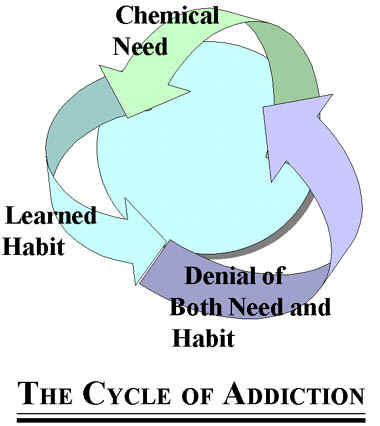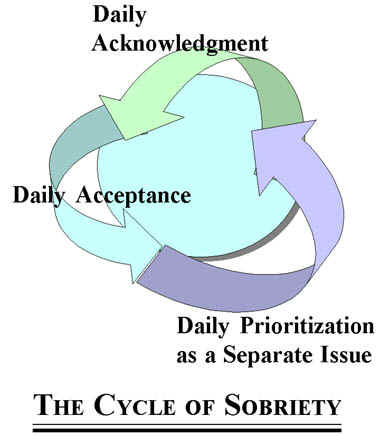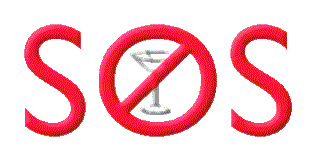The Sobriety Priority
A publication of Save Our Selves
Getting Help
One comes to a program of recovery from addiction when one is
most vulnerable, reaching out for help. This does not mean,
however, that one must sacrifice intellectual integrity or
compromise individuality in order to achieve and maintain a life
of sobriety.
Studies of religions and cults have consistently proved that
people tend to convert at times of great stress or failure in
their lives. These are times when promises of enlightenment and
cures for pain are most appealing. People don’t look for proof
or evidence or even coherence in belief. They see someone
throwing them a life-preserver, and they grab it.
When you’ve lost faith in yourself, its only too easy to find
it in something else.
Cognitive Sobriety
What is “cognitive sobriety?”
“Cognitive” means knowing, learning, perceiving. We look at
the world and our lives in a rational way and try to understand
the dynamics behind issues and events. The current “just say no”
philosophy doesn’t help people very much. How could it? We are
thinking beings. We need to know how, we want to know why.
Simpleminded slogans don’t fulfill these basic human yearnings.
Perhaps the pervasive repetition of such a slogan will convince
a few that it is no longer popular to “get ripped;” then again,
perhaps its dogmatic, self-righteous tone will have the opposite
effect.
Traditional therapies, usually based on AA’s twelve step
model, connect sobriety to God. New Agers or proponents of what
is called “transpersonal therapy” would connect it to some
mystical “unity” or “cosmic holism.”
Even those who are more rational often say, “If you get good,
you can get sober,” meaning that if you make other positive
changes in your life, sobriety will follow. Others will hedge:
“Well, you have to learn coping strategies. You have to alter
your life here, and take these certain steps to do such and
such.”
All these things may very well be valuable and important, and
I am not advocating that people just get sober and sit in a
chair. But I am saying that one should not lose sight of the
priority — which is sobriety, not goodness, not cosmic unity,
not obedience to the will of a so-called higher power. It’s
sobriety itself. Sobriety is a priority, but it’s not an
obsession. It offers a kind of backdrop against which one can
have a life, a meaningful life. If people want to just “be,”
they can do that, too, and be sober; I have met such people. And
I rejoice in their sobriety.
Some “experts” on alcoholism feel that alcoholics can
“unlearn” drinking behaviors and thus modify their intake. This
is a ludicrous idea. I wonder, do they plan eventually to apply
this approach to cocaine and heroin use as well?
Even though some addicted persons may be able to control
their drinking for varying periods of time, what have they
gained in the process? In his Natural History of Alcoholism,
psychiatrist George E. Vaillant writes, “Their situation [is]
analogous to driving a car without a spare tire — disaster [is]
usually only a matter of time.”
If an alcoholic chooses a life of sobriety, what has he or
she lost in the process?
A Personal Perspective
A number of years ago I stood by the hospital bed of a close
friend who had just died at the age of forty-seven. He had been
“only a heavy drinker,” diagnosed as “nonalcoholic.” Yet he died
of alcohol-related deterioration. The doctors in attendance said
that he had simply “fallen apart” physically. I’ve known persons
of all ages who have tried time after time to find a way to
handle their “problem drinking.” I can’t think of a single case
where sobriety would have brought them harm. I had a seven-month
interruption in my seventeen years of consuming alcohol. That
period of sobriety ended with a bizarre “celebration:” I was
“able to drink again.” To “prove” it, I downed a fifth of
premixed vodka martinis. When I related this to my therapist at
the time, she agreed that “this, indeed, makes good sense.”
Several years later, when I got sober again, I had a more
difficult time of it. To wit: screaming and shaking and sweating
and thinking that I was dying. My alcoholism had deepened
profoundly, and I had abandoned my nonchalant attitude as well
as my agreeable therapist. By so doing I abandoned the
alcoholic’s most persistent nemesis: denial.
Those seven months had merely been a “time out.” Visions of
future drinks were dancing in my head. I had had no program, no
strategies for (or commitment to) my sobriety. Now I do.
In 1978, when I began my new period of sobriety, I was scared
half to death. I have wanted to retain the positive essence of
this experience as a way of maintaining a healthy respect for my
arrested condition. I wanted a life of sobriety this time, not
dreams of future drinks. And I was willing to do whatever was
required to achieve that.
Reflections and Research
During my first year of sobriety I questioned a number of
sober alcoholics, searching for the common thread for their
successes in maintaining a lasting sobriety. When I was about
three years into my sobriety, I began to challenge some of the
concepts of Alcoholics Anonymous, but felt that I stood alone in
that endeavor. By the time I was sober for five years, I had
compiled an extensive file of responses and, from four years ago
to the present day I’ve collected data from more than two
thousand “sobrietists.” Both from this research and from my own
experience of recovery, I have put together a specific secular
approach to achieving and maintaining long-term sobriety. I call
it the “Sobriety Priority.” I wish to offer it here as a way
(beware of anyone who offers the way) to achieve and
maintain sobriety for life.
With the Sobriety Priority, arresting one’s chemical
addiction and staying sober becomes the top priority. It is
separate from everything else in one’s life, including religious
or spiritual beliefs. Rather than turning one’s life and will
over to an outside force or higher power, recovering alcoholics
and addicts credit themselves daily for achieving and
maintaining sobriety, empowering themselves, rebuilding
self-esteem, and building the best possible protection against
relapse. This is not a “spiritual” or “twelve step” program. And
it’s not a package deal. Achieving and maintaining sobriety is
approached as a separate issue, not as part of a larger
mystic/holistic plan that requires fear of one’s human
imperfections. The Sobriety Priority method works. Thousands
have used it successfully, not only for drug and alcohol
addiction, but for other addictions, such as overeating and
gambling.
The Cycle of Addiction
The Sobriety Priority approach for achieving and maintaining
freedom from alcohol and other mind-altering drugs is a
cognitive strategy. It can be applied, on a daily basis, as long
as one lives, to prevent relapse.
The Sobriety Priority approach respects the power of “nature”
(genetic inheritance, physiological constitution) and of
“nurture” (learned habit, behaviors, and associations)by showing
how to achieve the initial arrest of cellular addiction and
stave off the chronic habits that result from this addiction.
The “cycle of addiction” contains three debilitating
elements: chemical need (at the physiological cellular level),
learned habit (chronic drinking/using behavior and
associations), and denial of both need and habit.
The cycle of alcohol addiction usually develops over a period
of years. Cycles have been found to be much shorter with other
drugs, especially cocaine. In all cases, however, the addiction
becomes “Priority One,” a separate issue from everything else.
And as it progresses, it begins to negate everything else.

The Cycle of Sobriety
The cycle of addiction can be successfully replaced by
another cycle: the cycle of sobriety. This cycle contains three
essential elements: acknowledgment of one’s addiction to alcohol
or drugs (you may have euphemistically called it “a problem”);
acceptance of one’s addiction; and prioritization of sobriety as
the primary issue in one’s life.
The daily cognitive application of a new “Priority One,” the
Sobriety Priority, as a separate issue, arrests the cycle of
addiction. It frees the sober alcoholic/addict to experience
“everything else,” by teaching him or her to associate
“everything else” with sobriety, not with drinking or using
behaviors. The cycle of sobriety remains in place only so long
as the sober alcoholic/addict cognitively chooses to continue to
acknowledge the existence of his or her arrested addiction(s).
The Sobriety Priority, applied daily, gradually weakens booze
and drug associations, halting the cycle of addiction, allowing
time for new associations to form as one experiences life
without addictive chemicals. As one continues to “make peace”
with the facts regarding his or her arrested addiction—that is,
as one continues to recognize alcohol and drugs as a
non-option—one comes to prefer a sober life-style; one longs to
preserve it, to respect the arrested chemical addiction, and to
protect the new, sober life.

Portions of this brochure are excerpted from Unhooked:
Staying Sober and Drug-Free (Prometheus Books, 1989) by
James Christopher, founder of SOS.
Publication of this material is made possible by support from
SOS members and friends and by the Council for Secular Humanism,
a nonprofit educational organization.
Copies of this and other SOS brochures may be obtained from
the SOS Clearinghouse. This brochure was updated January, 2000.
SOS Clearinghouse
Save Our Selves (SOS)
4773 Hollywood Blvd
Hollywood, CA 90027 USA
Phone # 323-666-4295
e-mail SOS@CFIWest.org
Thank You at CFI West for this web page. To
see all of this web site go to

|
